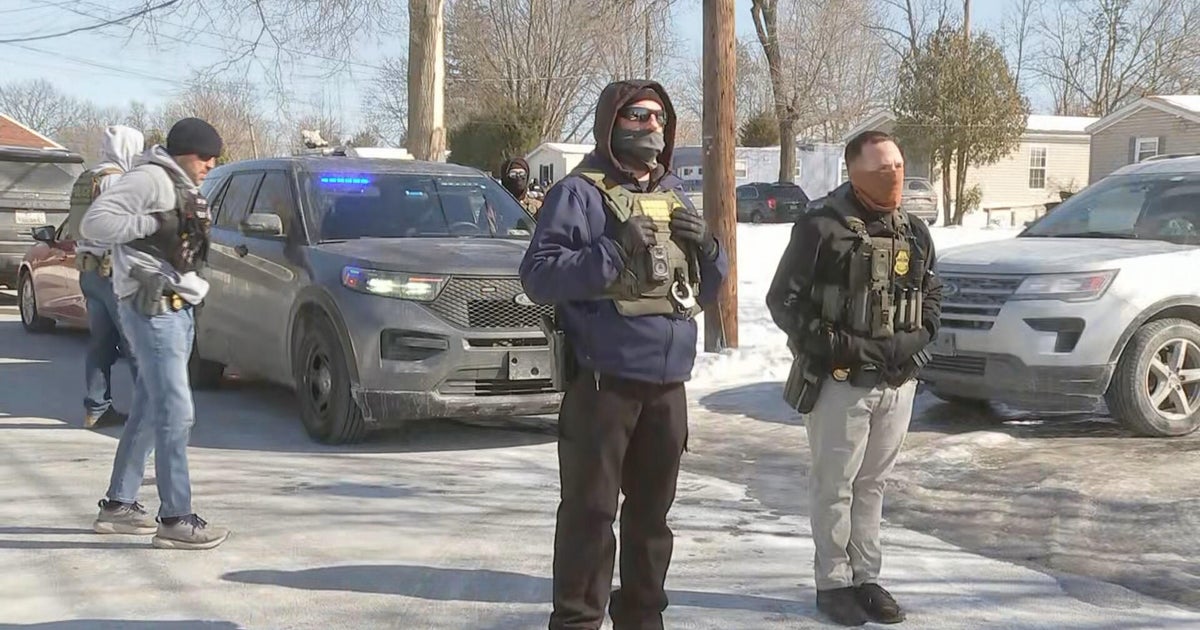Transcript: National security adviser Jake Sullivan on "Face the Nation," August 22, 2021
The following is a transcript of an interview with White House national security adviser Jake Sullivan that aired on Sunday, August 29, 2021, on "Face the Nation."
ED O'KEEFE: We go now to President Biden's national security adviser, Jake Sullivan. Jake, thank you for being with us. The president said Saturday that the Friday attack that killed two ISIS targets, quote, "was not the last and that we'll continue to hunt down those involved in the attack." Will any of those attacks potentially occur outside of Afghanistan"
NATIONAL SECURITY ADVISER JAKE SULLIVAN: Well, ED, first of all, it is something that we are very closely tracking, whether there are any threats to the US homeland or to US interests anywhere else in the world. What the intelligence community has assessed to date is that the relevant terrorist groups in Afghanistan do not possess advanced external plotting capabilities, but of course, they could develop them. And that is something that we need to be very focused on. What we have proven over time in other countries, ED, is that we are capable of suppressing the terrorism threat, including external plotting capabilities without a large permanent presence on the ground. We have done that in places like Libya and Somalia, places like Yemen. And we will do that in Afghanistan as well as we go forward.
ED O'KEEFE: Some of those attacks have involved drones. Some of those attacks have involved sending aircraft to drop bombs. Is there any possibility after Tuesday that some kind of retaliatory attack on this scale will involve sending U.S. personnel back into Afghanistan?
SULLIVAN: The president does not intend to start a new war in Afghanistan. He intends to end the one after two decades. That being said, he also is going to talk to his commanders about whatever set of tools and capabilities they need to get the people who attacked and killed our troops at the Kabul airport and to make sure that we are degrading and debilitating the group, ISIS-K, that conducted this attack. So, yes, we will continue to take the kinds of over-the- horizon strikes like we did over the weekend against the ISIS-K facilitators and plotters. And, yes, we will consider other operations to go after these guys, to get them and to take them off the battlefield.
ED O'KEEFE: In plain English, "over the horizon" means from somewhere else, right?
SULLIVAN: Over the horizon means from outside of Afghanistan without keeping thousands of troops on the ground in the middle of another country's civil war.
ED O'KEEFE: Got it. There are a few hundred Americans left this weekend in Afghanistan that the State Department is aware of that want to get out of the country. Will they all get out by Tuesday?
SULLIVAN: What we are doing right now, ED, is working one by one with those individuals and their families to direct them to a rally point near the airport to come into the airport and to get on the planes and go home. We have the capacity to have 300 Americans, which is roughly the number we think are remaining, come to the airport and get on planes in the time that is remaining. We moved out more than that number just yesterday. So from our point of view, there is an opportunity right now for American citizens to come, to be admitted to the airport and to be evacuated safely and effectively. There are those Americans, though, ED, and this is important, who have chosen thus far not to leave Kabul. Maybe they've lived there for many years. Maybe they have extended family there. Our message to those Americans is that after August 31st, we will make sure there is safe passage for any American citizen, any legal permanent resident. And yes, we will ensure the safe passage of those Afghans who helped us to continue coming out after the 31st of August.
ED O'KEEFE: But how are you going to do that? And doesn't that mean relying on the Taliban?
SULLIVAN: This isn't about reliance. This is about ensuring that we use the leverage we have available to us, and it is considerable, to hold the Taliban to its commitments. The Taliban have both communicated privately and publicly that they will allow for safe passage. We're not just going to take their word for it. We've rallied dozens of countries from around the world to stand with us in saying to the Taliban that if they do not follow through on those commitments, there will be significant consequences. And the leverage we have, the economic leverage and the other forms of leverage we continue to possess, we believe will be effective in ensuring that we can get out other people who want to come out after the 31st of August.
ED O'KEEFE: Economic leverage I get because you can squeeze a country's official with sanctions all you want. But if you're pulling all your US military equipment out of there, if you're pulling out all, if not most of your diplomatic personnel out of there, what on earth kind of leverage is there left?
SULLIVAN: Well, first of all, you just identified economic leverage, which I wouldn't put off to one side. We are talking about Afghanistan's relationship with the international financial system, its access to any kind of reserves and resources. That is a significant source of leverage. Second, the Taliban, in looking to find countries around the world for it to be able to work with the United States is rallying the international community in a united way to ensure that the commitment on safe passage is not just a commitment to us, but to everyone else. And then third, of course, ED, without going into any kind of detail, we obviously retain a variety of capabilities that are both not economic and not diplomatic that we could bring to bear in the event that American citizens are somehow held at risk in Afghanistan going forward.
ED O'KEEFE: Does the US plan to leave State Department personnel in Afghanistan after Tuesday?
SULLIVAN: Our current plan is not to have an ongoing embassy presence in Afghanistan as of September 1st, but we will- at least a permanent presence. But we will have means and mechanisms of having diplomats on the ground there, be able to continue to process out these applicants, be able to facilitate the passage of other people who want to leave Afghanistan. And over time, depending on what the Taliban does, how it follows through on its commitments with respect to safe passage, how it deals with the treatment of women, how it deals with its international commitments not to allow Afghanistan to become a base for terrorism in the rest of the world, we can make further determinations about both diplomatic presence and other issues as we go. But the onus will be on the Taliban to prove out its commitments and its willingness to abide by the obligations that- that it has undertaken and that are imposed upon it by international law.
ED O'KEEFE: A guy who used to work with former Defense Secretary Leon Panetta, former CIA Director Leon Panetta, said this past week the US will have to eventually send troops back into Afghanistan to root out ISIS and al-Qaeda. He just thinks it's going to have to happen at some point. Would the president consider that if those over the horizon capabilities you talk about, like drones and aircraft aren't enough at some point, or are you ruling out entirely the idea that U.S. military personnel would have to go back to Afghanistan?
SULLIVAN: It'd be fundamentally irresponsible of me to address a long term hypothetical based on circumstances that have arisen. Yet what I will tell you, ED, is that we have developed the capabilities to be able to suppress the terrorism threat in other countries where the advanced external plotting of the groups in those countries is acute, is real. And we believe we can do the same thing in Afghanistan. That is our intention. We will have a laser focus on that as we go forward. And we will continue to bring the fight to the terrorists in Afghanistan to make sure they do not represent a threat to the United States.
ED O'KEEFE: Jake, you're someone who's known the president a long time. You work alongside him every day. They call the presidency the loneliest job in the world. How has his morale been in recent days?
SULLIVAN: I would describe the president's approach to this in recent days in one word: focused. He is laser-focused 24 hours a day on protecting our forces there and getting this mission complete, getting these folks home safely and then executing the retrograde in a professional way. Every single day at the end of a meeting with his military commanders, he asks one question, is there anything else you need, any authority or tool or resource or capability to protect yourself and complete your mission? And every day he tells them, if there is, I will get it to you. He is focused on the mission at hand and on bringing it home.
ED O'KEEFE: Does he still have full confidence in his entire national security team?
SULLIVAN: Well, that's obviously a question for you to ask. And, you know, that is something that, from our perspective, is your job. Our job is to execute. Our job is to get this mission complete. And right now, the president is looking to his entire national security team to make that happen, to take this next critical, dangerous period where we face acute threats as we speak, minute by minute, hour by hour for my ISIS-K to ensure our troops have the protection that they need and to ensure they have what they are required- what- what is required to be able to carry out the rest of this mission. That is what we are trying to provide for them. That is all we are thinking about right now, and that is how we are going to bring this mission to a conclusion over the course of the coming days.
ED O'KEEFE: I have a semi-related question. The whole goal here was to get US military forces out of Afghanistan by September 11th. Whose idea was it to use 9/11 as the deadline?
SULLIVAN: When the decision was taken by the president to draw down our forces in Afghanistan, and he took that decision back in April, we had an impending May 1st deadline at which point the Trump administration had negotiated the removal of all American forces from the country. The president asked his commanders, how much time do you need to be able to get out of Afghanistan in a way that you feel will protect the forces and allow you to execute a drawdown that also protects our allies as they were coming out? And they gave him a timetable of 120 days, four months. And that is what has guided his decision making about coming out of Afghanistan from the start, has been the tactical advice of his commanders on the ground, and that is how we will ultimately bring this mission to a close.
ED O'KEEFE: So they didn't explicitly say 9/11. They said for months. And you guys all looked at the calendar and realized 9/11 was there and said, OK, let's try to do it by then?
SULLIVAN: What we said was that the mission would end before the 20th anniversary of September 11th. That is what the administration laid out. And it was based on 120-day timetable as briefed to the president by the commanders who felt that that was the appropriate timetable to try to execute the drawdown and the completion of the US military mission in Afghanistan.
ED O'KEEFE: Part of why I asked this, I know you don't oversee everything, you're in charge of national security, but this summer there was the July Fourth deadline in the hope of declaring independence from the pandemic. There's this 9/11 deadline where now the Taliban essentially is going to be back in control of Afghanistan on the 20th anniversary. Has there been any conversation about perhaps not using dates on a calendar to set White House policy anymore?
SULLIVAN: ED, I've got to tell you right now, what we are thinking about all day and all night, including every single hour of last night, is how do we protect our forces at the Kabul airport against imminent threats from ISIS-K? And how do we get those remaining American citizens and others out of the country? That's what I'm focused on. That's what we're trying to accomplish here. And we are going to keep our focus on that until we get the job done.
ED O'KEEFE: And we appreciate you taking some time to talk to us about all of that. Jake Sullivan, national security adviser to President Biden, thank you very much. And we'll be right back.
SULLIVAN: Thank you.



